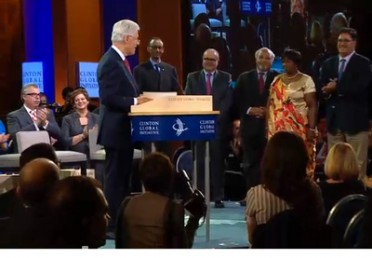Nursing helps improve health services in Rwanda

Nursing dean Terri Weaver (left) at the annual meeting of the Clinton Health Initiative, a group founded by former President Bill Clinton that leads a Rwanda health project with U.S. nursing schools.
Nursing dean Terri Weaver’s goal for her college is to leave a lasting impression on the world.
UIC is one of five U.S. nursing schools selected to participate in the new Rwanda Human Resources for Health initiative. The mission: improve nursing and midwifery, dental and medical education, and human resources in the east African nation.
Rwanda, a country of 11.7 million people, faces a severe shortage of highly qualified physicians, nurses, midwives and other health care workers.
The Rwandan Ministry of Health will coordinate the seven-year program; responsibility and control remain with the Rwandan government.
The Clinton Health Initiative, a global health organization founded by former President Bill Clinton, leads the efforts to coordinate the U.S. academic institutions.
At the invitation of the Clinton Health Initiative, Weaver traveled to New York last month to attend the organization’s annual meeting.
It was humbling to be in the presence of so many national and international leaders, including Clinton, Rwandan President Paul Kagame and Rwanda Minister of Health Agnes Binagwaho, Weaver said.
“This is a great opportunity for us to tell the world about what a difference the College of Nursing can make,” Weaver said. “It shows how we are leaders in nursing, not just nationally, but globally as well.
“President Clinton said this initiative is the largest cooperative global health effort ever undertaken between universities in the developed and developing world, and we’re extremely excited to be a part of it.”
A seven-member contingent of UIC faculty left for Rwanda in August on their year-long assignment, where they will serve as nurse educators and mentors.
In addition to the nursing schools (Duke, Howard University, New York University and the University of Maryland are also involved), nine U.S. medical schools will lend their expertise.
The U.S. schools are expected to send 100 faculty members a year for the program’s seven years.
The September meeting was not the first time Weaver met with Clinton.
She and several faculty members who are involved in the project were introduced to him in Chicago in July. During their visit, Clinton expressed his thanks for making the commitment to serve in Rwanda.
“This program will continue to demonstrate the strength of our health science leadership and continue to attract international interest in our college,” Weaver said. “This is going to be a challenge for us, but it’s important for us to lead the way.
“When we tell our students about world health, we first need to understand it ourselves. And we’re doing so with initiatives such as this.”
